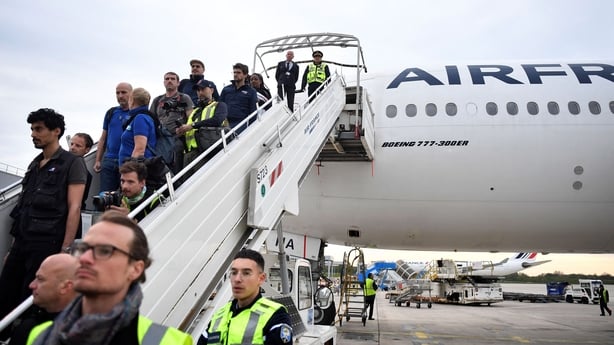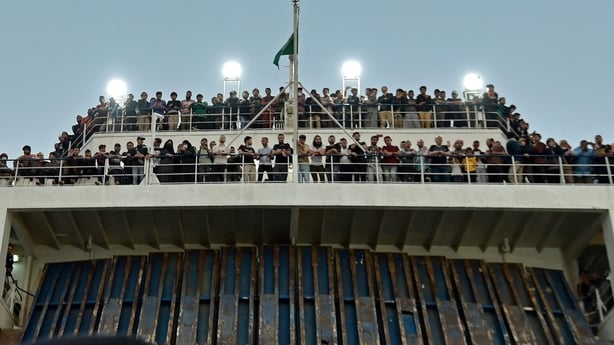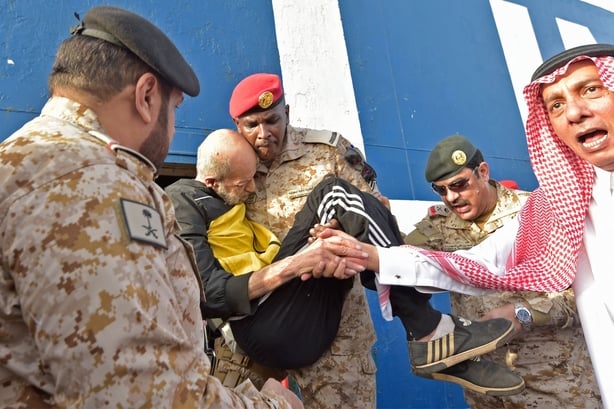A further 16 Irish citizens and their family members have been evacuated from Sudan since yesterday.
This brings the total brought to safety with the assistance of other countries, to 88.
They were evacuated from Sudan through Djibouti, Jordan and Cyprus.
The Department of Foreign Affairs said today that evacuation flights by EU partners and the UK are continuing today.
A consular and Emergency Civil Assistance Team on the ground in Djibouti is continuing to work with people as they are evacuated.
This assistance includes arranging accommodation when needed and advising on onward travel arrangements.
Irish embassies in Jordan, Egypt and Cyprus are providing consular assistance to Irish citizens and their families as they arrive in these countries.
Officials in Dublin and Nairobi are continuing to support those Irish citizens who remain in Sudan and who are still seeking to leave. It is understood that more than 100 Irish citizens remain in the country.
The Department of Foreign Affairs said that the 72-hour ceasefire announced on Monday night is "mostly holding", but that there are "reports of fighting in Omdurman and other areas".
It said that Irish citizens who are still in Sudan are continuing to register on a daily basis and embassy and department officials will stay in contact with anyone who has registered.
At a glance: What is happening in Sudan?
Battles reported around Khartoum during ceasefire

Regarding the humanitarian response in Sudan, the department also said it has been "closely monitoring the upsurge in violence and its impacts on the Sudanese people".
It said that the Humanitarian Response Plan for 2023 identified 15.8m people in need of humanitarian assistance before this outbreak of fighting started, and that $1.7 billion (€1.5bn) was needed to target 12.5m people who are most in need.
It said that Ireland had made an early contribution of €3 million to the Sudan Humanitarian Fund in March of this year, which is part of a larger $23m (€20.8m) fund that will be made available to "trusted partners who are best placed to respond in the western and southern regions of Sudan".
The department said that funds are also being made immediately available to existing humanitarian response partners for use in the most affected areas when operations can resume.
The Sudan Humanitarian Fund operates in cooperation with the Central Emergency Response Fund (CERF).
Ireland has contributed €11.5m to the CERF so far this year.
An allocation of $18m (€16.2m) from CERF was approved for Sudan before this escalation in the crisis happened.
The UN Humanitarian Coordinator in Sudan has been given approval to utilise those funds to address the current priority needs once operations can resume", it said.

Meanwhile, the British evacuation mission from Sudan has lifted 536 people to safety on six flights as the military races against time to rescue citizens while the fragile ceasefire holds.
The Foreign, Commonwealth and Development Office (FCDO) said "in a fast-moving situation" these were the figures at 9pm this evening "with further flights to come".
A boat with 1,687 civilians from more than 50 countries fleeing violence in Sudan has arrived in Saudi Arabia, the country's foreign ministry said, the largest rescue effort by the Gulf kingdom to date.
The group was "transported by one of the Kingdom's ships, and the Kingdom was keen to provide all the basic needs of foreign nationals in preparation for their departure," the ministry said in a statement.
Fighting broke out in Sudan on 15 April between forces loyal to army chief Abdel Fattah al-Burhan and his deputy turned rival Mohamed Hamdan Daglo, who commands the powerful paramilitary Rapid Support Forces (RSF).
At least 459 people had been killed and more than 4,000 injured as of yesterday across Africa's third-biggest country, according to UN agencies.
Saudi Arabia has received several rounds of evacuees by air and sea, starting with boats that arrived in Jeddah on Saturday carrying 150 people including foreign diplomats and officials.
On Monday, a C-130 Hercules military plane flew dozens of South Korean civilians to Jeddah's King Abdullah Air Base, and a boat ferried nearly 200 people from 14 countries across the Red Sea from Port Sudan.

Thirteen of the civilians who arrived on Wednesday were Saudi, while the rest came from countries across the Middle East, Africa, Europe, Asia and North and Central America, the foreign ministry statement said.
All told, 2,148 people have been evacuated to the kingdom from Sudan so far, including more than 2,000 foreigners, the statement said.
We need your consent to load this rte-player contentWe use rte-player to manage extra content that can set cookies on your device and collect data about your activity. Please review their details and accept them to load the content.Manage Preferences
Concern staff travel to safe location
Concern's country Director for Sudan says he and a number of colleagues, including two Irish citizens, have travelled to a safe location in Sudan.
Speaking on RTÉ's Morning Ireland, AKM Musha said they travelled, as part of a convoy involving around 80 vehicles and hundreds of people.
The journey took around 34 hours, he said.
"It was difficult for everyone - particularly for the children, women and older citizens," Mr Musha said.
People in Sudan had needed humanitarian support before the conflict began, he said, adding that the suspension of humanitarian operations is making things even more difficult.
"15.8 million people are suffering," he said.
"Hospitals are not working, banks are not working. People have money in the bank but they cannot access the bank because banks are not operating.
"They cannot really buy food, there is no electricity. It's a difficult life here."
Additional reporting: AFP, PA






